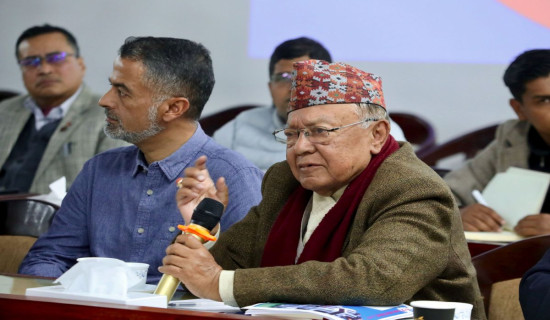- Friday, 6 February 2026
Chomsky On Rise Of Trump
Noam Chomsky’s work titled "Who rules the world?" does provide an interesting and grounded account of the plutocratic politics of Donald Trump who clinched victory in the last November US presidential election. Though the Chomsky’s book sharply focuses on the Trump’s policies of his first term in the White House, the facts and insights contained in the book appear to be true to the current term of the incumbent US president who took office formally on Jan 20, 2025. President Trump has been a faithful and conservative Christian holding larger support from and sympathy of white evangelicals and other conservative Christians in the US.
Trump supports Jesus, and without Jesus, America will fall, had been the battle cry of many of the Trump’s Christian supporters in Southern states in the US during the polls. When Trump was campaigning for his presidential bid this time he was increasingly infusing his campaign events with Christian rhetoric and imagery. Evangelical and conservative Christians were seen holding the banner in his campaign rally saying Jesus is our savior and Trump is our president. Evangelical Christianity is one of the most popular types of Christianity in the world. According to a data, one-third of the 78.4 per cent of American adults who identify as Christians call themselves as Evangelical.
Evangelical Christianity
Evangelical Christianity is a faith movement that has grown in importance in the United States over the last five decades. The Christian Fundamentalist movement, which emerged in the United States around 100 years ago, gave birth to today’s Evangelicalism. The concept of evolution was the main turning point of such a movement. Charles Darwin’s scientific idea of evolution became the catalyst for Christian groups to review their ideologies and put them forward in politics and popular culture in the US. Darwin’s scientific idea said that humans developed from and alongside other living forms over billions of years. This was supported by archaeological data and other scientists, and because of that, it spurred questions regarding the origins of man as stated in the Bible.
Suddenly, the Bible was questioned by philosophers, scientists, and the masses. This became problematic in terms of core Christian beliefs around the turn of the 20th century. The initial fundamentalist movement was considered as a religious rebirth, spurred on by objections to Darwin’s Theory of Evolution. Evangelicalism today attracts Christians who want a faith group to resist the relaxation of social standards in a modernising, culturally diverse society as held by Democrats, much like the early Fundamentalist movement did. Trump capitalized on the resentments of the fundamentalist Christians and won their support to emerge victorious in the poll.
According to Noam Chomsky, there are definite similarities between Trump’s triumph in the US presidential bid and rise of far right ultranationalists in Germany, France, Britain and many other European and Asian countries. Moreover, Trump’s rise can be attributed to the effects of the neoliberal policies of the past generation, argues Chomsky. These have led to extreme concentration of wealth along with stagnation for the majority. There have been repeated crashes of the deregulated financial institutions, each worse than the last. Bursting bubbles have been followed by huge public bailouts. Another consequence is breakdown of the social order. Studies have found out a close correlation between inequality and a range of social disorders.
Rising inequality is a prime factor in breakdown of social order. There have been similar effects in the UK under harsh austerity policies implemented basically by the Conservatives, extending elsewhere in many ways. Commonly, the hardest hit are the weak. Latin America suffered two lost decades under destructive structural adjustment policies. It’s sometimes argued the neoliberal policies were a grand success, pointing to the fastest reduction in global poverty in history — but failing to add that these remarkable achievements were in China and other countries that firmly rejected the prescribed neoliberal principles, contends Chomsky.
The neoliberal assault is a prominent factor in the breakdown of the social order that leaves great numbers of people angry, disillusioned, frightened, contemptuous of institutions that they see are not working in their interests. Public education has come under harsh attack during the neoliberal years including sharp defunding, business models that favour cheap and easily disposable labour instead of faculty, teaching-to-test models. This undermine critical thinking and inquiry, and much else. The main target is to have a population that is passive, obedient and atomised, even if they are angry and resentful, and thus easy prey for demagogues skilled in tapping ugly currents that run not too far below the surface in every society.
Deaths of despair
Globalisation has been designed to set working people throughout the world in competition with one another while private capital is lavished with benefits. Democratic institutions have eroded. As already mentioned, all of this has led to anger, bitterness, often desperation — one remarkable effect is the increasing mortality among middle-aged, analysed as “deaths of despair,” a phenomenon unknown in functioning societies. While there are variations from place to place, some features are common. One is the decline of the centrist parties that have long dominated political life, as we see in election after election.
In the US, in recent years, whenever candidates arose from the base in the Republican primaries, the established plutocratic powers were able to crush them and impose their own choice. Donald Trump was able to crush his rivals in the primaries as he was leading in most of the states in the polls. Chomsky assesses Trump’s style of functioning in the concluding chapter of the book stating “How Trump will handle what he has brought forth – not created but unleashed – we cannot say. Perhaps his most striking characteristic is unpredictability. A lot naturally depends on his circle of advisors and indications on that front are unattractive to put it mildly. We are almost assured that Supreme Court will be in hands of reactionaries for many years with predictable consequences”.
(The author is presently associated with Policy Research Institute (PRI) as a senior research fellow. rijalmukti@gmail.com)









-original-thumb.jpg)







